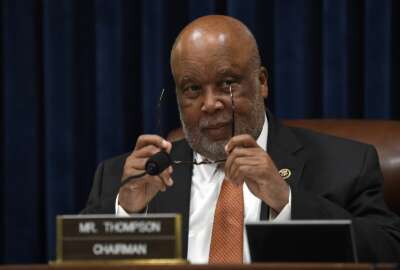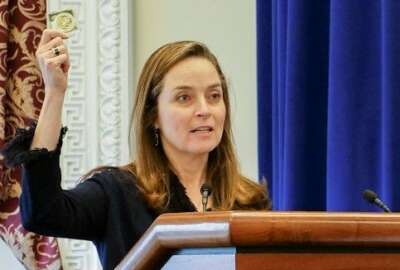
New bill to help temporary federal workers save for retirement
In today's Federal Newscast, A bipartisan pair of lawmakers want to give some federal employees a new retirement flexibility.
To listen to the Federal Newscast on your phone or mobile device, subscribe on PodcastOne or Apple Podcasts. The best listening experience on desktop can be found using Chrome, Firefox or Safari.
- A bipartisan pair of lawmakers want to give some federal employees a new retirement flexibility. Congressmen Derek Kilmer (D-Wash.) and Tom Cole (R-Okla.) introduced the Federal Retirement Fairness Act. The bill would let participants in the Federal Employee Retirement System make catch-up contributions toward their annuities. Temporary employees generally can’t count their time in service toward their retirement annuities. This bill would allow employees in that position to credit toward their annuities for any work performed on or after January 1, 1989. (Federal Managers Association)
- It’s almost here — the 2019 Federal Employee Viewpoint Survey will open in two waves starting May 13. Each agency’s survey will be open for six weeks and available for all employees. The Office of Personnel Management is urging agencies to try and get as many employees to participate by explaining how FEVS results make changes. Results will start going out in August. (Chief Human Capital Officers Association)
- The Government Accountability Office and the former inspector general at the Department of Homeland Security are urging Congress to focus on long-term structural challenges at DHS. There’s bipartisan concern in Congress over the series of recent leadership changes at the department. But former IG John Roth said lawmakers should focus on staffing up the secretary, deputy secretary and management directorate offices. He said top leadership were often surprised by the IG findings he presented to them during his career at DHS. (Federal News Network)
- The Senate Foreign Relations Committee approves nine nominees for State Department leadership roles. The nominees include CIA chief operating officer Brian Bulatao, President Donald Trump’s pick to serve as undersecretary for management, as well as Alan Swendiman, the president’s nominee for deputy director of the Peace Corps. Committee Chairman Jim Risch said lawmakers have shown bipartisan support for the nominees, and once confirmed play a vital role in staffing up the agency. (Senate Foreign Relations Committee)
- Trump signed a new cybersecurity workforce executive order. The EO creates a cybersecurity rotational assignment program for federal employees. It would detail IT and cyber professionals into the Department of Homeland Security and vice versa. The EO also instructs the Office of Personnel Management and DHS to come up with a list of reskilling aptitude tests that agencies could use to evaluate if their employees are good candidates for cybersecurity training. (Federal News Network)
- Army General James McConville said he wants to focus on bettering personnel and acquisition if he is confirmed as the next Army chief of staff. McConville told the Senate Armed Services Committee he plans to make sure soldiers don’t feel like a cog in a machine and that their talents are appreciated. McConville also said he will evaluate the outcomes of the new Army Futures Command, which changes the way the service procures weapons. (Federal News Network)
- The nominee to run the National Reconnaissance Office doesn’t think his agency should be absorbed into the Space Force if Congress creates the service. Christopher Scolese said the NRO is better served as an independent office because it supports the Defense Department, combatant commanders as well as the civilian community.
- Flooding at the Nebraska Air Force base that houses U.S. Strategic Command has left dozens of structures damaged beyond repair. Air Force officials raised their damage estimate for Offutt Air Force Base earlier this week, saying Missouri River flooding had done more harm than they first thought. At least 60 buildings will have to be demolished and rebuilt after floods inundated the base with water that was nine feed deep in some places. In all, more than 130 structures saw serious damage. The service believes it will need $420 million to restore Offutt. (Federal News Network)
- Department of Veterans Affairs workers who are also members of the American Federation of Government Employees could see big changes. VA is introducing new bargaining proposals. One suggests cutting official time from 1 million, to 10,000 hours a year. Proposals to streamline the hiring and job classification process are also on the table. VA Secretary Robert Wilkie said it’s time for a “reset” in the department’s approach to labor-management relations. (Department of Veterans Affairs)
- A new data strategy from the Department of Health and Human Services looks to improve access to HHS data, while making it easier to use for research purposes and using it to modernize its workforce. The strategy is part of HHS’ implementation of the Foundations for Evidence-Based Policymaking Act signed into law last January. (Department of Health and Human Services)
- The General Services Administration will launch a new platform by the end of December to test out an approach to let agencies contracting officers buy commercial products more like they do in their personal lives. GSA delivered its e-marketplace implementation plan to Congress yesterday outlining this proof-of-concept. The approach would create at least two e-marketplace platforms from private sector providers who will act as middle men connecting buyers with sellers. GSA also is asking Congress to increase the micro purchase threshold to $25,000 from $10,000 for proof of concept. The agency will release a solicitation by the end of June to buy the e-marketplace platform services. (Federal News Network)
- The Office of Federal Procurement Policy is busting a new set of acquisition myths. OFPP explained to contracting officers and industry how innovation is possible in federal procurement as part of its fourth mythbusting memo. Lesley Field, deputy administrator of OFPP, busts the innovation myths by describing agency case studies as examples. OFPP also is requiring each CFO Act agency to designate an industry liaison to improve communications with contractors. (White House)
- A new competition to prove how the federal government can create its own applied research hub is open. The GEAR Center, short for Government Effectiveness Advanced Research, will bring together agencies, industry and academics to solve challenges facing government, from workforce reskilling to artificial intelligence. The Office of Management and Budget is putting up $300,000 as initial funding for the GEAR Center. Ideas must be submitted by May 24 and winners will be announced Aug. 1. (Federal News Network)
Copyright © 2025 Federal News Network. All rights reserved. This website is not intended for users located within the European Economic Area.
Eric White
Eric White is news anchor and Federal Drive producer at Federal News Network.
Follow @FEDERALNEWSCAST
Related Stories
AP/Susan Walsh

With bipartisan concern over DHS leadership changes, overseers urge Congress to focus on long game
Office of Personnel Management

Race is on to create GEAR Center for federal applied research
Related Topics
Acquisition
Acquisition Policy
Air Force
All News
Army
collective bargaining
commercial products
Congress
Congress
Contracting
Cybersecurity
Defense
Defense News
Department of Health and Human Services
Department of Homeland Security
Derek Kilmer
executive order
Facilities/Construction
Federal Drive
Federal Employee Viewpoint Survey
federal employees
Federal Employees Retirement System
Federal Newscast
FERS
Foundations for Evidence-Based Policymaking Act
GEAR center
General Services Administration
Government Accountability Office
House of Representatives
James McConville
Management
military bases
Office of Federal Procurement Policy
Office of Management and Budget
Office of Personnel Management
People
Space Force
State Department
Technology
Tom Cole
Unions
Veterans Affairs
Workforce



